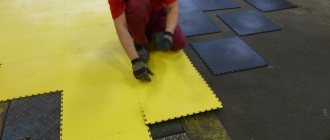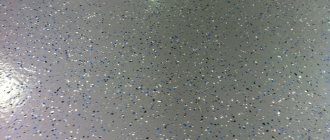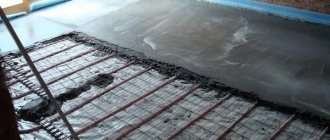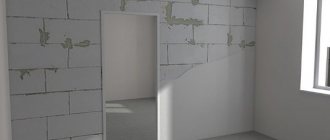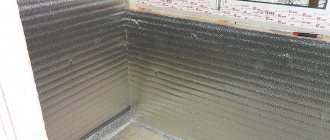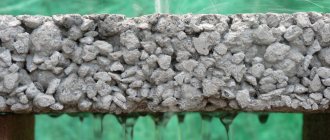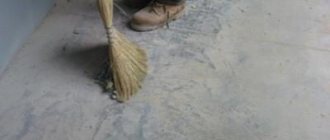Industrial floors are highly durable coatings that are used in commercial premises subject to heavy loads. Floor coverings for civil and industrial premises are highly wear-resistant, which ensures their long-term operation. Industrial floors are suitable for arranging warehouses, shopping centers, hotels, hospitals, etc. Modern technologies make it possible to produce materials that are practically not subject to mechanical and chemical influence.
What are industrial floors?
Industrial floors are a separate group of floor coverings with improved physical and mechanical parameters. Their main properties include:
- high strength;
- wear resistance;
- chemical neutrality;
- moisture resistance;
- fire safety;
- mechanical stability.
For civil and industrial premises, specialized types of materials can be manufactured that have the following specific qualities:
- antistatic;
- hygiene;
- non-hygroscopic;
- low/high current conductivity.
Highly wear-resistant coatings, even under conditions of intense and constant load, can last at least five years. Unlike household flooring materials, they have worse aesthetic characteristics, but many times improved technical properties.
Scope of application
Heavy-duty materials with good physical and mechanical properties are used in public places, as well as civil and industrial premises. What is their scope of application?
- Food industry: confectionery factories, sugar production, meat processing plants, dairies and tobacco factories;
- Civil premises: trading floors, exhibition centers, airports, offices, parking lots, service stations and train stations;
- Medical industry: factories and workshops for the production of medical equipment, pharmaceutical enterprises, medical institutions;
- Chemical, oil refining and instrument making industries.
It is worth considering that the floors of public and industrial premises are covered with different flooring materials. Each of them has its own performance characteristics, advantages and disadvantages, which allow the use of coatings in a particular area.
Types of industrial coatings
What types of industrial flooring are there? In most cases, floors in industrial premises are finished using materials that contain concrete or polymers. Due to the plasticizers and fillers added to the working mixture, floors acquire specific qualities that are just suitable for rooms with high traffic. The following types of industrial floors are distinguished.
Concrete
Concrete floor is a separate type of floor covering made from a cement mixture, which includes sealing impregnations and mineral fillers. Subsequently, the top layer of the material is strengthened with a special impregnation or paint, which prevents dust formation. This design is very resistant to mechanical loads, so it is often used in service stations, car services, furniture factories and underground garages.
Advantages:
- waterproof;
- wear resistance;
- acid resistance;
- quick installation;
- low cost.
Flaws:
- tendency to dust formation;
- inelasticity;
- low shock resistance.
Topping
Topping refers to concrete structures that have subsequently been treated with a special strengthening mixture. The concrete contains high-grade cement, which provides the floor with a considerable service life. Topping floors with high wear resistance can contain various additives, slags and quartz inclusions. Each of the additives affects the technical characteristics of the material, which provide it with a wide range of applications: service stations, auto repair shops, gas stations, industrial workshops and factories.
Polymer floors for industrial premises
Design advantages:
- durability;
- seamlessness;
- quick installation;
- chemical resistance;
- dustlessness.
Design disadvantages:
- susceptibility to cracks;
- moderate moisture resistance;
- high price.
Raised floors
A raised floor is a structure that consists of an adjustable board on special racks. This covering consists of steel posts with adjustable heights, metal profiles and flooring material. A raised floor is convenient because you can install a communications system underneath it, lay electrical cables and not hide them in specially built-in gutters. The false structure is ideal for furnishing an office, operating room, as well as premises in which a large number of communications are used.
Advantages:
- quick installation;
- high strength;
- maintainability;
- ability to hide communications.
Flaws:
- high price;
- leakage;
- short period of service.
Despite the fact that the raised floor does not have high wear resistance, it can be used for arranging the floors of civil and industrial premises. In particular, for an office, exhibition hall, as well as rooms with a lot of electronics, a raised floor is almost ideal. Industrial floors, photos of which are presented below, clearly demonstrate the advantages of this type of coating in comparison with other materials.
Advantages
Modern industrial floor modular systems are a high-tech floor with a whole range of positive characteristics.
Laying
The modular floor has the advantage of being easy to install. It can be laid on almost all types of substrates. The technology does not require scrupulous preparation and can be implemented without interrupting the production process . This advantage is relevant in areas where downtime leads to serious financial losses.
In addition to the fact that small potholes and cracks in the base cannot affect the performance characteristics of the finished system, a modular floor can be called mobile. The finished surface can be dismantled and installed again, which is in demand in rented areas.
Features of operation
Rubber and PVC tiles are good at eliminating noise interference. In workshops with noisy production processes, this advantage increases productivity. In addition, the coating retains heat well, that is, it acts as additional thermal insulation.
The characteristics of the material are optimally suited for installing floors in rooms where machinery operates with strong vibration, in areas with an unstable climate, and in refrigeration rooms.
Other advantages of industrial modular coatings are:
- the finished coating demonstrates high mechanical and impact strength;
- lack of rigid attachment to the base;
- possibility of local repair;
- safe and most comfortable operation. Correctly selected material can work at temperatures from -40 to +70 degrees;
- wide selection of textures and colors;
- the finished floor is resistant to chemical influences, including electrolytes, alkalis, oils, urea, sea water;
- modules are made from raw materials that do not harm humans during the operation of the coating;
- wide installation possibilities due to different types of locking connections, the possibility of installation with glue;
- noise reduction, sound insulation, which is important in noisy workshops;
- high maintainability – replacement of floorboards is carried out quickly and without extra costs;
- no deformation upon impact;
- strength and wear resistance;
- if the installation technology is followed, a sealed coating is formed that does not allow moisture to pass through;
- thermal insulation;
- possibility of temporary operation;
- Possibility of installing coatings indoors and outdoors.
The range of advantages is limited to several disadvantages. Firstly, both polyvinyl chloride and rubber coatings are afraid of the action of solvents. Modular floors cannot be used in extremely high temperatures.
Industrial polymer floors
Floor coverings that contain polymers should be placed in a separate category. Such materials are often called self-leveling floors, since during installation they are applied to the prepared base in a liquid state. As the material crystallizes, it becomes hard and very durable.
Modern technologies make it possible to produce liquid mixtures with good decorative and technical properties. For this reason, high-strength floors can easily be used for offices and shopping centers, service stations and gas stations, medical institutions and the pharmaceutical industry, food processing plants and chemical plants. What types of resin floors are there?
Epoxy
Epoxy floors are mixtures that include epoxy resins, plasticizers and polymers. They are used for the arrangement of civil and industrial facilities, i.e. office floors, pharmaceutical factory, car service, etc.
Advantages:
- high strength;
- indestructibility;
- hygiene;
- chemical neutrality.
Flaws:
- high price;
- sensitivity to temperature fluctuations.
Polyurethane
Polyurethane coatings are high-strength materials that are not afraid of mechanical stress or chemicals. They are ideal for furnishing an office, hospital, food shop, service station, as well as public premises (shopping hall, pavilion, supermarket).
Application of industrial self-leveling floors
Advantages:
- hygiene;
- chemical neutrality;
- tensile strength;
- non-susceptibility to mechanical influences.
Flaws:
- high price;
- susceptibility to combustion.
Methyl methacrylate
Methyl methacrylate is an ester compound with the addition of polymer fillers. The material contains synthetic additives, the vapors of which can be harmful to health. For this reason, it is not advisable to use it in public places. Despite this, the flooring is highly durable and shock-resistant, so it can be used in service stations, auto repair shops, woodworking enterprises, etc.
Advantages:
- resistance to temperature changes;
- high strength;
- non-hygroscopic;
- chemical neutrality.
Flaws:
- flammability;
- abrasion;
- toxicity.
Epoxy-urethane
The polymer material has high elasticity and bending strength. In many characteristics they resemble topping coatings. High-strength floors are suitable for furnishing civil and industrial facilities. Thanks to the ability to create a three-dimensional image on the surface, they are ideal for a shopping center, office, airport, conference room, etc.
Advantages:
- tensile strength;
- elasticity;
- resistance to low temperatures;
- hygiene.
Flaws:
- high price;
- flammability.
Useful tips
High-quality installation of modular industrial coating requires control over horizontal and vertical stability. In addition, joints that are too long should not be made. Otherwise, it will degrade the performance of the finished floor.
The system should not contain uneven seams, including significant horizontal differences. Deviation in evenness is permissible, but not more than 2-3 mm for every 2 m of surface .
No matter how large the area of work, the modules should not be placed at different levels. Therefore, during a preliminary inspection of the base, it is necessary to identify and eliminate sagging and bumps.
Coverage selection criteria
The floors of industrial buildings experience serious stress, but in different ways. Therefore, when choosing a specific type of material, you need to take into account many nuances. Modern technologies make it possible to create flooring materials with good characteristics, but each of them has its own strengths and weaknesses.
What points should be considered when choosing flooring?
- Mechanical loads - from falling tools, technical equipment, cars, warehouse racks;
- Chemical loads – from acids and alkalis, moisture;
- Hygiene – ability to clean, accumulate dust;
- Appearance – glossiness, roughness, texture, color.
The false structure cannot be used in rooms with high humidity. However, it will be indispensable for an office, medical facility, retail space and other public facilities. In turn, topping floors are not decorative enough, but are highly durable, so they are more suitable for service stations, gas stations, parking lots and the woodworking industry. Commercial flooring with high aesthetic values (self-leveling floors) is the best choice for civil premises.
Tools and accessories
Before starting work on installing an industrial modular floor, you must ensure that you have the tools and equipment.
To do this you will need the following:
- if operating conditions require the implementation of adhesive installation technology, you will need a spatula to apply the glue. A gear tool is used. The use of a spatula intended for installing tiles is unacceptable;
- jigsaw, electric saw, carpenter's knife - the tool will be needed for trimming. The type of equipment is chosen depending on the volume of work;
- A rubber mallet will be required to carefully fix the locking joints. In addition, using a rubber mallet, you can remove random air bubbles from under the coating;
- For marking, you will need a tool for marking lines and measuring. When carrying out installation work, you will need a tapping cord, usually a construction square, and a tape measure.

